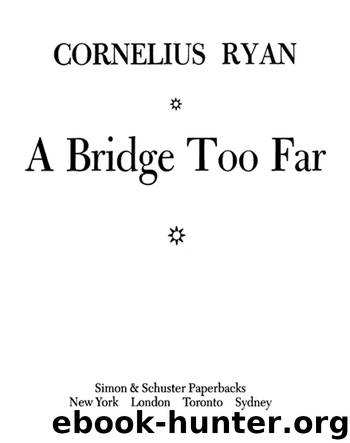A Bridge Too Far by Cornelius Ryan

Author:Cornelius Ryan
Language: eng
Format: epub, mobi
Publisher: Simon & Schuster
THE PROSPEROUS VILLAGE OF OOSTERBEEK seemed infused with a strange mixture of gaiety and uneasiness. Like an island in the middle of the battle, the village was assaulted by the noise of fighting on three sides. From the drop zones to the west came the nearly constant thunder of guns. To the northwest the chattering of machine guns and the steady cough of mortars could be clearly heard in the flower-lined streets, and to the east, two and a half miles away in Arnhem, black smoke hung over the horizon, a somber backdrop to the unceasing timpani of heavy artillery.
The bombing and strafing preceding the troop and glider landings on the previous day had produced casualties among the villagers and some damage to shops and houses, as had infiltrating snipers and ill-directed mortar bursts, but the war had not so far made serious inroads into Oosterbeek. The neat resort hotels, landscaped villas and tree-lined streets were still largely untouched. Yet it was becoming obvious with every hour that the fighting was coming closer. Here and there, concussion from distant explosions splintered panes of glass with startling suddenness. Charred particles of paper, cloth and wood, carried like confetti by the wind, rained down into the streets, and the air was acrid with the smell of cordite.
On Sunday Oosterbeek had been filled with troops as the British arrived almost on the heels of a frantic German departure. No one had slept during the night. A nervous excitement, heightened by the low whine of jeeps, the clatter of Bren gun carriers and the tramp of marching men, made rest impossible. Throughout most of the eighteenth the movement had continued. The villagers, joyous and yet apprehensive, had decked the streets and houses with Dutch flags and plied their liberators with food, fruit and drink as the British Tommies hurried through. To almost everyone the war seemed all but over. Now, subtly, the atmosphere was changing. Some British units were apparently firmly established in the village, and Lieutenant Colonel Sheriff Thompson’s artillery spotters occupied the tower of the tenth-century Dutch Reformed church near the Rhine in lower Oosterbeek, but troop movement had noticeably slowed. By late afternoon most thoroughfares were disquietingly empty, and the Dutch noted that antitank and Bren gun positions were now sited at strategic points on the main road. Seeing them, villagers had a sense of foreboding.
As he walked through Oosterbeek trying to discover exactly what was happening, Jan Voskuil recalls seeing a British officer ordering civilians to take in their flags. “This is war,” he heard the officer tell one villager, “and you are in the middle of it.” Throughout his walk, Voskuil noted that the mood of the people was changing. From Jaap Koning, a local baker, Voskuil learned that many Dutch were pessimistic. There were rumors, Koning said, that “things are not going well.” Apprehension was replacing the heady sense of liberation. “The British,” Koning said, “are being pushed back everywhere.” Voskuil was profoundly concerned. Koning was always well informed, and although his was the first bad news Voskuil had heard, it confirmed his own fears.
Download
This site does not store any files on its server. We only index and link to content provided by other sites. Please contact the content providers to delete copyright contents if any and email us, we'll remove relevant links or contents immediately.
| Africa | Americas |
| Arctic & Antarctica | Asia |
| Australia & Oceania | Europe |
| Middle East | Russia |
| United States | World |
| Ancient Civilizations | Military |
| Historical Study & Educational Resources |
The Rise and Fall of the Third Reich: A History of Nazi Germany by William L. Shirer(1214)
Flight by Elephant(1152)
German submarine U-1105 'Black Panther' by Aaron Stephan Hamilton(890)
Last Hope Island by Lynne Olson(806)
Unbroken: A World War II Story of Survival, Resilience, and Redemption by Hillenbrand Laura(782)
The Victors - Eisenhower and His Boys The Men of World War II by Stephen E. Ambrose(771)
0060740124.(F4) by Robert W. Walker(766)
The Guns at Last Light: The War in Western Europe, 1944-1945 by Rick Atkinson(746)
A Bridge Too Far by Cornelius Ryan(736)
War by Unknown(733)
The Hitler Options: Alternate Decisions of World War II by Kenneth Macksey(731)
The Railway Man by Eric Lomax(710)
All the Gallant Men by Donald Stratton(693)
Hitler's Armies by Chris McNab(678)
Rogue Heroes: The History of the SAS, Britain's Secret Special Forces Unit That Sabotaged the Nazis and Changed the Nature of War by Ben Macintyre(678)
Churchill's Secret War by Madhusree Mukerjee(675)
Hitler's Vikings by Jonathan Trigg(670)
A Tragedy of Democracy by Greg Robinson(648)
We Die Alone: A WWII Epic of Escape and Endurance by David Howarth & Stephen E. Ambrose(643)
